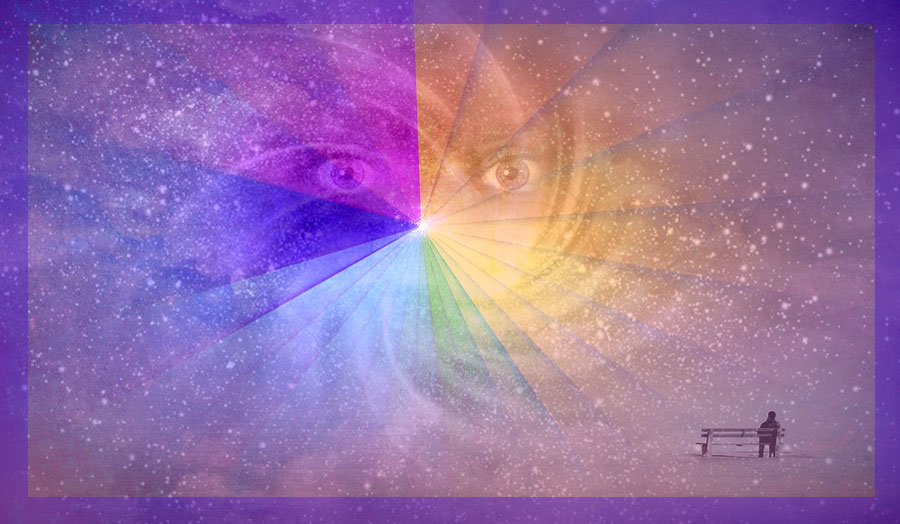Other Dimensional Realities ~ Part II
 by Jane Roberts
by Jane Roberts
Your own environment includes far more than you may have supposed. Earlier I referred to your environment in terms of the daily physical existence and surroundings with which you are currently connected. In actuality, you are aware of very little of your larger, more extensive environment. Consider your present self as an actor in a play; hardly a new analogy, but a suitable one. The scene is set in the twentieth century. You create the props, the settings, the themes; in fact you write, produce, and act in the entire production – you and every other individual who takes part.
You are so focused in your roles, however; so intrigued by the reality that you have created, so entranced by the problems, challenges, hopes, and sorrows of your particular roles that you have forgotten they are of your own creation. This intensely moving drama, with all its joys and tragedies, can be compared with your present life, your present environment, both individually and en masse.
But there are other plays going on simultaneously, in which you also have a part to play. These have their own scenery, their own props. They take place in different periods of time. One may be called “Life in the twelfth century A.D.” One may be called “Life in the eighteenth century,” or “in 500 B.C.,” or “in A.D. 3000.” You also create these plays and act in them. These settings also represent your environment, the environment that surrounds your entire personality.
I am speaking of the portion of you who is taking part in this particular period piece, however; and that particular portion of your entire personality is so focused within this drama that you are not aware of the others in which you also play a role. You do not understand your own multidimensional reality; therefore it seems strange or unbelievable when I tell you that you live many existences at one time. It is difficult for you to imagine being in two places at once, much less in two or more times, or
centuries.
Now stated simply, time is not a series of moments. The words that you speak, the acts that you perform, appear to take place in time, as a chair or table appears to take up space. These appearances however are a part of the complicated props that you have set up “beforehand,” and within the play you must accept these as real.
Four o’clock in the afternoon is a very handy reference. You can say to a friend, “I will meet you at four o’clock at the corner,” or at a restaurant, for a drink or a chat or a meal, and your friend will know precisely where and when he will find you. This will happen despite the fact that four o’clock in the afternoon has no basic meaning, but is an agreed-upon designation – a gentlemen’s agreement, if you prefer. If you attend the theatre at nine o’clock in the evening, but the actions of the play take place within the morning hours, and the actors are shown eating breakfast, you accept the time as given within the theatre’s play. You also pretend that it is morning.
Each of you are now involved in a much larger production, in which you all agree on certain basic assumptions that serve as a framework within which the play can occur. The assumptions are that time is a series of moments one after another; that an objective world exists quite independently of your own creation and perception of it; that you are bound within the physical bodies that you have donned; and that you are limited by time and space.
Other assumptions accepted for the same reason include the idea that all perception comes through your physical senses; in other words, that all information comes from without, and that no information can come from within. You therefore are forced to focus intensely upon the actions of the play. Now these various plays, these creative period pieces represent what you would call reincarnational lives.
They all exist basically at one time. Those who are still involved in these highly complicated passion play seminars called reincarnational existences, find it difficult to see beyond them. Some, resting between productions, as it were, try to communicate with those who are still taking part; but they themselves are merely in the wings, so to speak, and can only see so far.
The plays seem to be taking place one before the other, and so these communications seem to intensify the false idea that time is a series of moments, passing in a single line from some inconceivable beginning to some equally inconceivable end.
This leads you to think in terms of a very limited progress both in individual terms and in terms of your species as a whole. You think, those of you who have even considered reincarnation, “Well, certainly the race must have progressed from the time of the Middle Ages,” although you greatly fear it has not; or you turn to technological progress and say, “At least we have come a long way in that direction.”
You may smile and think to yourself that it is quite difficult to imagine a Roman senator addressing the multitudes through a microphone, for example; his children, watching his performance on television. But all of this is highly misleading. Progress does not exist in the terms that you consider it to, any more than time does.
In each play, both individually and en masse, different problems are set up. Progress can be measured in terms of the particular ways in which those problems were solved or not solved. Great advances have been made in certain periods. For example, great offshoots appeared that from your viewpoint you might not consider progress at all. In some plays, generally speaking, the actors are each working on a seemingly minute portion of a larger problem that the play itself is to resolve.
Though I use the analogy here of a drama, these “plays” are highly spontaneous affairs in which the actors have full freedom within the play’s framework. And granting these assumptions that have been stated, there are no rehearsals and as in any good theatre production, there is an overall theme within each play. The great artists, for example, did not emerge out of a particular time simply because they were born into it, or the conditions were favorable.
The play itself was concerned with the actualization of intuitive truth into what you would call artistic form, with a creativity of such vast and sweeping results that it would serve to awaken latent abilities within each actor and to serve as a model of behavior. Periods of renaissance – spiritual, artistic, or psychic – occur because the intense inner focus of those involved in the drama are directed toward those ends. The challenge may be different in each play, but the great themes are beacons to all consciousness. They serve as models.
Progress has nothing to do with time, you see, but with psychic and spiritual focus. Each play is entirely different from any other. The lives are simultaneous.
Your own multidimensional personality is so endowed that it can have these experiences and still retain its identity. It is, of course, affected by the various plays in which it takes part. There is instant communication and an instant, if you prefer, feedback system.
These plays are hardly without purpose. In them the multidimensional personality learns through its own actions. It tries out an endless variety of poses, behavior patterns, attitudes, and changes others as a result.
The word “result,” you see, automatically infers cause and effect – the cause happening before the effect, and this is simply one small example of the strength of such distortions, and of the inherent difficulties involved with verbal thought, for it always implies a single-line delineation.
You are the multidimensional self who has these existences, who creates and takes part in these cosmic passion plays, so to speak. It is only because you focus in this particular role now that you identify your entire being with it. You have set these rules for yourself for a reason. And consciousness is in a state of becoming, and so this multidimensional self of which I speak is not a psychological structure completed and done with. It is also in a state of becoming.
It is learning the art of actualization. It has within it infinite sources of creativity, unlimited possibilities of development. But it has yet to learn the means of actualization, and must find within itself ways to bring into existence those untold creations that are within it.
Therefore it creates varieties of conditions in which to operate, and sets itself challenges, some doomed to failure in your terms, at least initially, because it must first create the conditions which will bring new creations about. And all of this is done with great spontaneity and unbounded joy.
You therefore create far more environments than you realize. Now, each actor, going about the role, focused within the play, has an inner guide line. He is not left, therefore, abandoned within a play that he has forgotten in his own creation. He has knowledge and information that comes to him through what I call the inner senses.
He has other sources of information, therefore, than those strictly given within the confines of the production. Each actor knows this instinctively, and there are periods set and allowed for within the play itself in which each actor retires in order to refresh himself. In these he is informed through the inner senses of his other roles, and he realizes that he is far more than the self appearing in any given play.
In these periods he understands that he had his hand in the writing of the play, and he is freed from those assumptions that bind him while he is actively concerned with the drama’s activities. These periods, of course, coincide with your sleep states and dreaming conditions; but there are also other times when each actor sees quite clearly that he is surrounded by props, and when his vision suddenly pierces the seeming reality of the production.
This does not mean that the play is not real, or that it should not be taken seriously. It does mean playing a role – an important one. Each actor must of himself realize, however, the nature of the production and his part in it. He must actualize himself out of the three-dimensional confines of the play’s setting.
There is great cooperation behind such momentous productions, and in playing his role, each actor first actualizes himself within three-dimensional reality. The multidimensional self cannot act within three-dimensional reality until it materializes a portion of itself within it.
Within this reality, it then brings about all kinds of creativity and development that could not appear otherwise. It must then propel itself from this system however, through another act, another actualization on the part of itself that is three-dimensional.
During its three-dimensional existence it has helped others in ways that they could not otherwise be helped, and it has been itself benefited and developed in ways that would be impossible otherwise.
The meaning of the play is within you, therefore. It is only the conscious portion of you that acts so well, and that is focused so securely within the props of the production.
The purpose of any given life is available to you, the knowledge beneath the surface of the conscious self you know. All kinds of hints and clues are also available. You have the knowledge of your entire multidimensional personality at your fingertips. When you realize that you do, this knowledge allows you to solve the problems or meet the challenges you have set, quicker, in your terms; and also opens further areas of creativity by which the entire play or production can be enriched.
To the extent, therefore, that you allow the intuitions and knowledge of the multidimensional self to flow through the conscious self, to that extent not only do you perform your role in the play more effectively, but also you add new energy, insights, and creativity to the entire dimension.
Now it seems to you, of course, that you are the only conscious part of yourself, for you are identifying with the actor in this particular production. The other portions of your multidimensional personality, in these other reincarnational plays, are also conscious, however. And because you are a multidimensional consciousness, “you” are also conscious in other realities beside these.
Your multidimensional personality, your true identity, the real you, is conscious of itself, as itself, in any of these roles.
These “period pieces,” overall, have a particular purpose. By the very nature of consciousness, it seeks to materialize itself in as many dimensions as possible – to create from itself new levels of awareness, new offshoots. In doing so it creates all reality. Reality, therefore, is always in a state of becoming. The thoughts that you think, for example, in your actor’s roles, are still completely unique and lead to new creativity. Certain aspects of your own consciousness could be fulfilled in no other way.
When you think of reincarnation, you suppose a series of progressions. Instead the various lives grow out of what your inner self is. They are not thrust upon you by some outside agency. They are a material development, as your consciousness opens up and expresses itself in as many ways as possible. It is not restricted to one three-dimensional lifetime, nor is it restricted to three-dimensional existence alone.
Your consciousness then takes many forms, and these forms need not be alike any more, say, than a caterpillar is like a butterfly. The soul or entity has complete freedom of expression. It changes its form to suit its expression, and it forms environments like stage settings, and worlds to suit its purposes. Each setting brings forth new developments.
The soul or entity is highly individualized spiritual energy. It forms whatever body you now wear, and is the motive power behind your physical survival, for from it you derive your vitality. Consciousness can never be still, but seeks further creativity.
The soul, therefore, or entity, endows three-dimensional reality, and the three-dimensional self with its own properties. The abilities of the entity lie within the three-dimensional self. The three-dimensional self, the actor, has access to this information and to these potentials. In learning to use these potentials, in learning to rediscover its relationship with the entity, the three-dimensional self raises still further the level of achievement, comprehension, and creativity. The three-dimensional self becomes more than it knows.
Not only is the entity strengthened, but portions of it, having been actualized in three-dimensional existence, now add to the very quality and nature of that existence. Without this creativity, planetary life in your terms would always be sterile. The soul or entity then gives breath to the body, and to the three-dimensional self within it. The three-dimensional self then goes about its purpose of opening up new areas of creativity.
Entities or souls, in other words, send out portions of themselves to open up avenues of reality that would not exist otherwise. The three-dimensional selves, in existing within these realities, must focus their attention there completely. An inner awareness gives them a source of energy and strength. They must, however, come to understand their roles as actors, “finally” from their roles, and through another act of comprehension, return to the entity.
There are those who appear within these plays fully aware. These personalities willingly take roles, knowing that they are roles, in order to lead the others toward the necessary realization and development. They lead the actors to see beyond the selves and settings they have created. These personalities from other levels of existence oversee the play, so to speak, and appear among the actors. Their purpose is to open up within the three-dimensional selves those psychological doorways that will release the three-dimensional self for further development in another system of reality.
You are learning to be co-creators. You are learning to be gods as you now understand the term. You are learning responsibility – the responsibility of any individualized consciousness. You are learning to handle the energy that is yourself, for creative purposes.
You will be bound to those you love and those you hate, though you will learn to release and lose and dissipate the hatred. You will learn to use even hatred creatively and to turn it to the higher ends, to transform it finally into love.
The settings in your physical environment, the sometimes lovely paraphernalia, the physical aspects of life as you know it, are all camouflages, and so I call your physical reality a camouflage. Yet these camouflages are composed of the vitality of the universe. The rocks and stones and mountains and earth are living camouflage, interlocking psychic webs formed by minute consciousnesses that you cannot perceive as such. The atoms and molecules within them have their own consciousness, as do the atoms and molecules with your body.
Since you all have a hand in forming this physical setting, and since you are ensconced yourself in a physical form, then using the physical senses you will only perceive this fantastic setting. The reality that exists both within it and beyond it will elude you. Even the actor is not entirely three-dimensional, however. He is a part of a multidimensional self.
Within him there are methods of perception that allow him to see through the camouflage settings, to see beyond the stage. He uses these inner senses constantly, though the actor part of himself is so intent upon the play that this escapes him. In a large manner, the physical senses actually form the physical reality they seem to only perceive. They are themselves part of the camouflage, but they are like lenses over your natural inner perceptions that force you to “see” an available field of activity as physical matter; and so they can be relied upon only to tell you what is happening in a superficial manner. You can tell the position of the other actors for example, or time by clock, but these physical senses will not tell you that time is itself a camouflage, or that consciousness forms the other actors, or that realities that you cannot see exist over and beyond the physical matter that is so apparent.
You can, however, using your inner senses, perceive reality as it exists apart from the play and your role in it. In order to do this you must, of course, momentarily at least turn your attention away from the constant activity that is taking place – turn off the physical senses, as it were – and switch your attention to those events that have escaped you earlier.
Highly simplified indeed, the effect would be something like changing one set of glasses for another, for the physical senses are as artificial, basically speaking, to the inner self, as a set of glasses or a hearing aid is to the physical self. The inner senses, therefore, are but rarely used completely consciously.
You would be more than disoriented, for example, but quite terrified, if between one moment and the next your familiar environment as you knew it disappeared to be replaced by other sets of data that you were not ready to understand, so much information from the inner senses must be translated in terms that you can comprehend. Such information must somehow make sense to you as three-dimensional selves, in other words.
Your particular set of camouflages is not the only set, you see. Other realities have entirely different systems, but all personalities have inner senses that are attributes of consciousness, and through these inner senses communications are maintained about which the normally conscious self knows little. Part of my purpose is to make some of these communications known.
The soul or entity, then, is not the self that reads this. Your environment is not simply the world about you as you know it, but also consists of past life environments upon which you are not now focusing.
Your real environment is innocent of space and time as you know them. In your real environment you have no need for words, for communication is instantaneous. In your real environment you form the physical world that you know. The inner senses will allow you to perceive the reality that is independent of physical form.
I have spent some time emphasizing the fact that each of us forms our own environment, because I want you to realize that the responsibility for your life and your environment is your own.
If you believe otherwise, then you are limited; your environment then represents the sum total of knowledge and experience. As long as you believe your environment to be objective and independent of yourself, then to a large extent you feel powerless to change it, to see beyond it, or to imagine other alternatives that may be less apparent.
Excerpt from Seth Speaks
See Part I here.
Posted in Other Topics, Science For The New Age, Spiritualitywith comments disabled.






[…] Fonte: http://www.unariunwisdom.com/other-dimensional-realities-part-ii/ […]